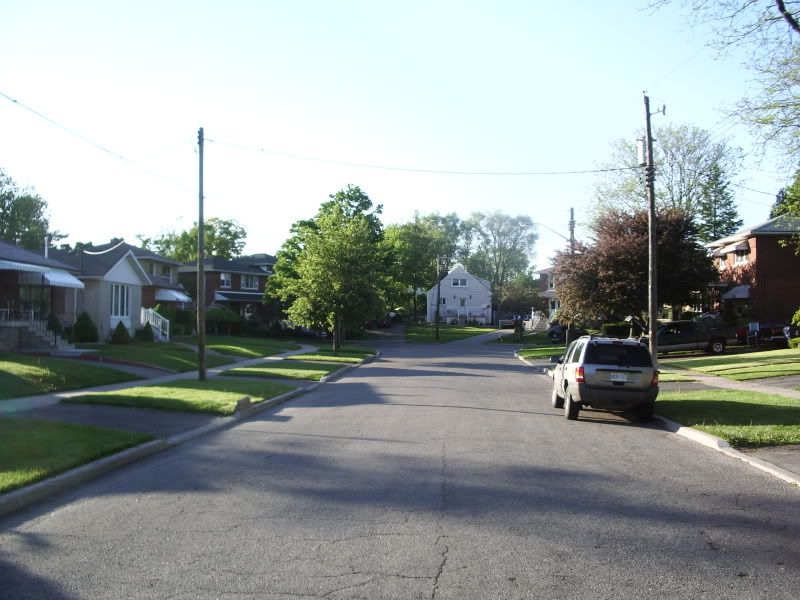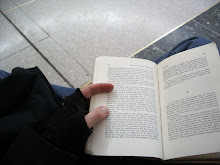Suburbia

For most of my life, I have lived in Suburbia. As I am reliant on public transit for mobility, I can say what a pain in the ass it is to move about the city from where I am - I spend a good three hours each day commuting to and from school - but aside from that (and my friends living in different parts of the city), I can't help but find Suburbia rather fascinating.
Upon first glance, Suburbia seems rather quaint, even tranquil: the quiet residential streets lined with trees and single-family dwellings sprinkled with sounds of backyard gatherings around the barbecue, children playing and dogs barking. As we peel away the veneer and peek beneath the surface, however, we find the real Suburbia, and so the fun begins.
Just the other day, I could overhear my neighbours yelling back and forth at one another (this is what I get for leaving my window open to allow for circulation). This time, I didn't hear anyone tell them to shut up, which I might have expected; perhaps I could have been the one to lay it on them, but why deprive myself of the wonder and amazement I experience when observing human behaviour? That's the psychologist in me, I reckon. As I was saying, at that point, I thought to myself how much longer these people might live, wound so tightly, their souls would make for exceptional snare drums.
So much more lies beneath Suburbia's pristine shell. Within these pastel houses, some are drinking away their sorrows (or using other substances to achieve a similar end), some are screaming at their teenage children for staying out all night, some are about to have a heart attack or stroke, and others have other reasons for their misery. Many waste away in front of the television set, and all are drowning in the sea of expenses necessary to maintain the illusion.
But wait, there's more! I imagine in every other household, there exists some form of mental illness as described by our latest source of dogma, the Diagnostic and Statistical Manual of Mental Disorders - going even further, I might be so bold to claim there is a general disharmony in just about every household. Drug dens have begun operation on our quiet residential street, but not to worry, folks, for your kids won't have to venture into Skid Row to buy their pot! Nowadays, the local residents have taken to complaining about the influx of "immigrants"; how ironic, given that most of these people were once "immigrants" themselves (in my neighbourhood in particular, there is an increasing Middle Eastern presence that is starting to vex the White residents; they worry that the Muslims are taking over as indicated by their television sets, despite the fact that most of these new residents are Christian - further along the ladder of irony, Christianity happens to be the precursor to Islam). Lest we forget the ever-pervasive panic over losing all of our wonderful stuff. Television tells us to beware of the criminal element who will steal our children and DVD players in the night, but won't tell us why.
My mother always wondered why, growing up, I was always so negative. When I see my neighbourhood - and I mean see my neighbourhood for what it is - I wasn't the only one; is it any wonder why, immersed in negativity, I was mired in depression for so many years? How often have I heard how "good" things are in Suburbia? I hope my latest entry has served to question such an assertion, if not smash it altogether.
Someone once commented on this place resembling a cemetery. The more I think about it, the more I see the resemblance: much like a cemetery, we have these decorative dwellings for which we paid exorbitant sums of money, and lie dead within them. Appearing seems more important than being, than living. This place is a cemetery, though it doesn't have to be, if only we could just let go.
Look carefully at the image you see before you, for it is cracked, and through these fissures will you see the truth. Soon, there will be nothing to conceal the truth - the fact that it has remained hidden has exacerbated the problem. I must clarify, this shell will not crumble with the physical infrastructure; rather, it will dissolve as do our ignorance and fear.
In Christian folklore - I was raised as such, so these examples are readily available - it is said that Jesus the Christ will return, and when he does, we will stand naked before him, i.e. we will not be able to hide anything anymore. If you ask me, I don't believe he ever left; in fact, I wonder if we really need a Jesus Christ to see what is.


0 Comments:
Post a Comment
<< Home